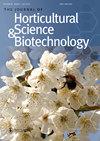收获后褐硼砂花挥发物的产生。1 .克隆类型和孵育温度的影响
IF 2.1
4区 农林科学
Q2 HORTICULTURE
Journal of Horticultural Science & Biotechnology
Pub Date : 1999-01-01
DOI:10.1080/14620316.1999.11511133
引用次数: 2
摘要
摘要:本文评估了四种遗传上不同的褐硼砂(boronia megastigma Nees)克隆在收获后的培养过程中提高花中精油(溶剂萃取花产品)浓度的潜力。花在12℃和308℃的孵育过程中取样48小时。无性系间观察到的变化有显著差异。孵育后,花提取物浓度的增加幅度从3%到19%不等,观察到的最大花提取物浓度为2.13%(以干重为基础)。提取物的挥发性成分增加了25% ~ 117%,主要挥发性成分b-ionone的浓度增加了45% ~ 181%。总挥发物最大浓度为0.47%,b-ionone最大浓度为0.165%;所有数值均以干花重量的百分比表示。收获后花提取物、总挥发物和b-离子酮的增加以250号无性系最为显著。增加我…本文章由计算机程序翻译,如有差异,请以英文原文为准。
Production of volatiles in brown boronia flowers after harvest. I: Effect of clonal type and incubation temperature
SummaryThe potential for enhanced concentrations of essential oils (solvent-extracted floral products) in flowers from four genetically distinct clones of brown boronia (Boronia megastigma Nees) as a result of post-harvest incubation was assessed. Flowers were sampled throughout 48 h of incubation at 12 and 308C. There was significant variation in the changes observed between clones. Increases in the concentration of floral extract as a result of incubation varied from 3% to 19%, the maximum concentration of floral extract observed was 2.13% (dry-weight basis). The volatile portion of the extract increased by between 25 and 117%, and the concentration of b-ionone, the main volatile of interest, increased by between 45 and 181%. The maximum concentration of total volatiles observed was 0.47%, and of b-ionone, 0.165%; all values being expressed as a percentage of dry flower weight. The most significant increase in floral extract, total volatiles and b-ionone after harvest, occurred in clone 250. Increases i...
求助全文
通过发布文献求助,成功后即可免费获取论文全文。
去求助
来源期刊
CiteScore
3.90
自引率
5.30%
发文量
67
审稿时长
3 months
期刊介绍:
The Journal of Horticultural Science and Biotechnology is an international, peer-reviewed journal, which publishes original research contributions into the production, improvement and utilisation of horticultural crops. It aims to provide scientific knowledge of interest to those engaged in scientific research and the practice of horticulture. The scope of the journal includes studies on fruit and other perennial crops, vegetables and ornamentals grown in temperate or tropical regions and their use in commercial, amenity or urban horticulture. Papers, including reviews, that give new insights into plant and crop growth, yield, quality and response to the environment, are welcome, including those arising from technological innovation and developments in crop genome sequencing and other biotechnological advances.

 求助内容:
求助内容: 应助结果提醒方式:
应助结果提醒方式:


